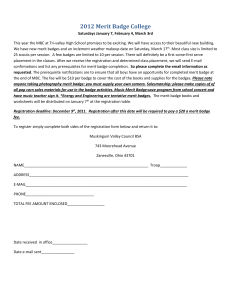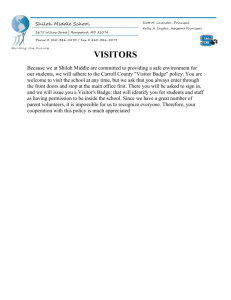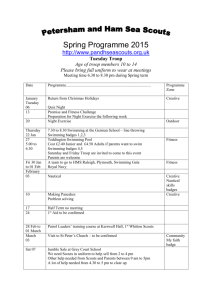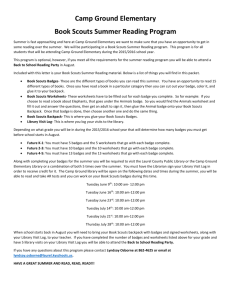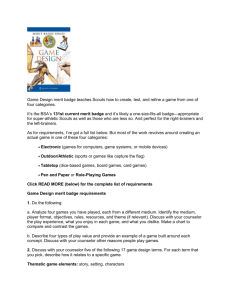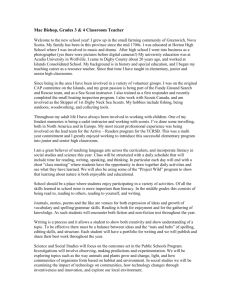Merit Badges for Court of Honor
advertisement
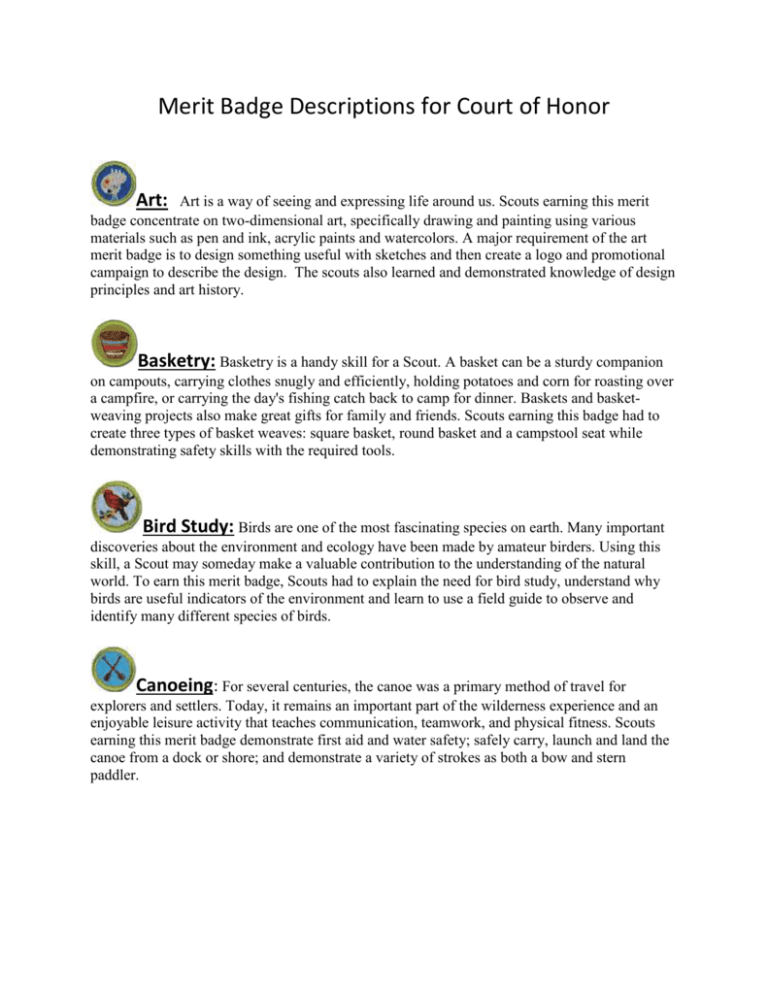
Merit Badge Descriptions for Court of Honor Art: Art is a way of seeing and expressing life around us. Scouts earning this merit badge concentrate on two-dimensional art, specifically drawing and painting using various materials such as pen and ink, acrylic paints and watercolors. A major requirement of the art merit badge is to design something useful with sketches and then create a logo and promotional campaign to describe the design. The scouts also learned and demonstrated knowledge of design principles and art history. Basketry: Basketry is a handy skill for a Scout. A basket can be a sturdy companion on campouts, carrying clothes snugly and efficiently, holding potatoes and corn for roasting over a campfire, or carrying the day's fishing catch back to camp for dinner. Baskets and basketweaving projects also make great gifts for family and friends. Scouts earning this badge had to create three types of basket weaves: square basket, round basket and a campstool seat while demonstrating safety skills with the required tools. Bird Study: Birds are one of the most fascinating species on earth. Many important discoveries about the environment and ecology have been made by amateur birders. Using this skill, a Scout may someday make a valuable contribution to the understanding of the natural world. To earn this merit badge, Scouts had to explain the need for bird study, understand why birds are useful indicators of the environment and learn to use a field guide to observe and identify many different species of birds. Canoeing: For several centuries, the canoe was a primary method of travel for explorers and settlers. Today, it remains an important part of the wilderness experience and an enjoyable leisure activity that teaches communication, teamwork, and physical fitness. Scouts earning this merit badge demonstrate first aid and water safety; safely carry, launch and land the canoe from a dock or shore; and demonstrate a variety of strokes as both a bow and stern paddler. Citizenship in the Community: As scouts fulfill the requirements for this merit badge, they will learn how to become active community members. They learn how good citizens help make decisions about their community through their elected officials, to be aware of and grateful for their liberties and rights, and to participate in their local governments. Climbing: Climbing is not a sport that requires tremendous muscular strength, but it demands mental toughness and the willingness to practice hard to master a set of skills. Scouts who earn this merit badge not only get to explore and enjoy the adventure of climbing, but can also find a new way to enjoy the outdoors. Coin collecting: is one of the oldest of all hobbies. Hoards of ancient coins found in excavations indicate that coins were one of the first collectibles. From earliest times, people valued coins not only as a means of trading and storing wealth, but also as miniature works of art. While doing this merit badge, scouts learn about the hobby and investment opportunities in coin collecting. They discuss and talk about their own collection and demonstrate their knowledge on how to grade, display, and handle their coins properly. Citizenship in the World: Scouts are good world citizens. Scouts who earn the Citizenship in the World merit badge will discover that they are already citizens of the world. They learn that being a good world citizen means that each of us must be willing to understand and appreciate the values, traditions, and concerns of people in other countries. Citizenship in the Nation: As scouts fulfill the requirements for this merit badge, they will learn how to become active national citizens. They learn to be aware of and grateful for their liberties and rights, to participate in their governments and to protect their freedom by helping to defend their country and standing up for individual rights on behalf of all its citizens. Communications: Communications in today’s world involves sending, receiving and interpreting information in more ways than ever before. With better and newer technologies appearing every day, scouts earning this merit badge learned to promote the effective and ethical practice of human communications. Scouts explored different ways of communicating such as talking person-to-person; interpreting information from print, radio and television media; and the pros and cons of new electronic devices such as email and texting. Scouts kept journals of their activities to help discover ways to improve their communication skills. Dentistry: Medical evidence points to the fact that a healthy body starts with healthy teeth and gums. A healthy mouth helps a person to speak, eat well and keep infection at bay. A major requirement of this merit badge was to schedule a visit with a dentist to learn how the dentist performs oral examinations and tools used for various treatments. Scouts earning this merit badge have studied tooth and gum structure; causes of tooth decay and gum disease; and ways to promote good oral health. Emergency Preparedness: Scouts are often called upon to help because they know first aid and they know about the discipline and planning needed to react to an emergency situation. Earning this merit badge helps a Scout to be prepared by learning the actions that can be helpful and needed before, during, and after an emergency. Earning the First Aid Merit Badge was a pre-requisite to earning the Emergency Preparedness Merit Badge. Engineering: Engineers use both science and technology to turn ideas into reality. From the tiniest computer chip to the sprawling highways and bridges that connect our great country, engineers play a big role in making life better. Scouts earning this merit badge were required to study an engineering achievement that has made a significant impact on society; investigate a common household item to discover how it was built and why it works; and personally visit with a real-life engineer to learn more about the field of engineering. Environmental Science: In fulfilling the requirements for this eagle required merit badge, Scouts will get a taste of what it is like to be an environmental scientist, making observations and carrying out experiments to investigate the natural world. Family Life: The family is the basic unit of society and is important to both individuals and communities. The world is rapidly changing, making today's society much more complex than ever before. As Scouts earn this merit badge, they will realize why it is important to know more about family life and how to strengthen their families. Fingerprinting: No two fingerprints are alike and nowhere is that more evident than in the field of fingerprinting. In earning the Fingerprinting merit badge, Scouts learn about and use an important technique that is used by law enforcement officers, along with other materials like matching dental records and DNA sampling, to help identify amnesia victims, missing persons, abducted children, and others. First Aid: “Be Prepared” is a cornerstone philosophy in scouting. So, too, is it in the field of First Aid. Being prepared for an emergency can save a life. Caring for an injured or ill person until they can receive professional medical care is an important skill for every Scout. Scouts earning the First Aid Merit Badge learn basic first aid skills that can provide immediate care to someone who is hurt or who becomes ill. With this basic knowledge, Scouts are prepared to take action in a variety of emergencies and situations that occur both near and far from home. Fishing: In Scouting for Boys, Baden-Powell offers this advice: "Every Scout ought to be able to fish in order to get food for himself. A tenderfoot who starved on the bank of a river full of fish would look very silly, yet it might happen to one who had never learned to catch fish." In earning the Fishing Merit Badge, scouts were required to demonstrate safety knowledge, describe different types and styles of fishing and practice “Leave No Trace” techniques. Geology: Geology is the study of Earth: its elements and natural materials; the processes that change it; and its history including the impact of human civilization. A Scout should understand the ever changing geology of the Earth in order to advocate for its future health. Among the requirements for this merit badge included a review of a geologic map to identify various rocks like horizontal, folded, or faulted formations. Hiking: Considered a very difficult merit badge to get, scouts who completed the requirements for the hiking merit badge have completed the planning and implementation five 10-mile day hikes and one 20-mile day hike. Hiking is often the only way too see things that are off the beaten path and is great way to keep your body fit and strong. It is also a lot of fun. Want to feel like a real explorer? You might consider taking this merit badge. Leatherwork: Scouts who completed the requirements of the Leatherwork merit badge explored leather's history and its endless uses. They learned to make a useful leather item using the same types of raw materials that our ancestors used; and tried skills like hand-stitching, lacing, and braiding. They also learned how to preserve and protect leather items so they will last a lifetime and beyond. Lifesaving: The main purpose of the Lifesaving merit badge is to prepare Scouts to assist those involved in water accidents. Scouts earning the Lifesaving merit badge were required to demonstrate basic knowledge of water rescue techniques, the skills to perform them, and the judgment to know when and how to respond to emergencies. Mammal Study: A mammal may weigh as little as an ounce or as much as 150 tons, like the blue whale. It may spring, waddle, swim, or even fly. But if it has milk for its young, has hair of some kind, is relatively intelligent, and has warm blood, then it is a mammal. Scouts earning the Mammal Study merit badge were required to distinguish mammals from all other animals, explain how the animal kingdom is classified and study mammals in their natural habitats. Music: When words fail, music speaks. Music is almost as old as mankind itself – an outlet for self-expression since dawn of time. From the classical period on through modern rock and roll, music touches lives. Scouts earning the Music merit badge were required to participate in the experience of music by singing or playing a simple song or hymn and reading all the signs and terms of the score. Scouts also learned how tones are generated and how instruments produce sound. Orienteering: Orienteering, which is the use of map and compass to find locations and plan a journey, has been a vital skill for humans for thousands of years. Orienteering is also a recognized sport at the Olympic Games, and thousands of people participate in the sport each year in local clubs and competitions. Scouts that earn this badge learn these skills in depth and learn to map out and complete orienteering courses. Personal Fitness: Giving boys an understanding of the importance and benefits of keeping oneself physically, mentally, socially, and spiritually fit is a core goal of scouting. Personal fitness is an individual effort and desire to be the best one can be. Regardless of their current levels of personal fitness, in the twelve weeks it will take Scouts to complete the athletic requirements for this merit badge, they will be in better shape, feel better about themselves, have more energy, and gain self-confidence in their overall abilities. Personal Management: The personal management merit badge is an eagle required merit badge, so it is considered a very important merit badge for all scouts to take. Boys who complete this badge study and understand how to manage their personal finances including how to save money for items they want to buy, prioritizing purchases, how to find the best deal when it comes time to purchase, and how to purchase it. For 13 weeks, the boys taking this badge track their income and expenses and learn how to save money for purchases. This badge also introduces boys to concepts of investing including what types of investments exist, how to pick one, what interest is, and how credit cards work. Pioneering: Pioneering is the knowledge of ropes, knots, and splices along with the ability to build rustic structures by lashing together poles and spars—this is among the oldest of Scouting's skills. By learning and using the concepts of pioneering, scouts earning this merit badge were able to build a trestle using square and diagonal lashings. Public Speaking: Scouts who take this merit badge learn techniques for speaking in public and the value of preparing what you will say ahead of time to keep your audience interested and keep yourself calm. Even if you haven't stood at a podium on the stage and find the whole idea scary, sooner or later, someone is going to ask you to get up and say a few words. If you take this merit badge and learn to be prepared, it won't be scary. It can even be fun. Reptile/Amphibian: What scout can resist the intrigue of snakes, turtles, lizards, alligators, frogs or salamanders? Developing knowledge about these creatures leads to an appreciation for all native wildlife. Understanding the life cycle of a reptile or amphibian and keeping one as a pet can be a good introduction to natural history. Knowing about venomous species can help Scouts to be prepared to help in case of an emergency. Scouts earning the Reptile merit badge learned all of this and more. Rifle Shooting Merit Badge: By earning this badge, Scouts can develop their shooting skills while learning safe practices for handling firearms. Scouts must learn how to properly store guns, handle a rifle, and understand local firearms laws in addition to shooting a series of targets that demonstrate their proficiency in target shooting. Shotgun Shooting Merit Badge: By earning this badge, Scouts can develop their aerial shooting skills while learning safe practices for handling firearms. Scouts must learn how to properly store guns, handle a shotgun, and understand local firearms laws in addition to shooting a series of launched targets that demonstrate their proficiency in shotgun shooting. Rowing: The use of oars to propel a boat is known as rowing. It has grown from a basic method of transportation to a competitive sport and an enjoyable method of exercising. Scouts earning the Rowing merit badge are required to demonstrate rowing techniques individually and as a team. Scouts also must have completed the BSA Swimming Test and be knowledgeable in the principles of First Aid and Lifesaving Search and Rescue: Brand new in 2012, this merit badge teaches scouts how to be a prepared searcher and exposes them to variety of map reading, search, and locating skills required to conduct a successful search on land, sea, or air. They learn how to be part of a search team, how to work with other search and rescue agencies, and understand what their role is on the team. Swimming: Swimming is a leisure activity, a competitive sport, and a basic survival skill. Scouts who earned this badge learned about safety when swimming and diving, how swimming can contribute to overall fitness and health, and gain some basic competitive swimming skills. Traffic Safety: Staying safe in traffic is critical in this day and age as more and more people take to the road. Earning the Traffic Safety merit badge gave Scouts some crucial tools to stay safer: whether driving a car on a highway, riding a bike across town, or jogging across a busy street. Weather: Meteorology is the study of Earth's atmosphere, its weather and the ways in which temperature, wind, and moisture act together in the environment. In addition to learning how everyday weather is predicted, Scouts learned about extreme weather such as thunderstorms, tornadoes, and hurricane and how to stay safe in these conditions. Wood Carving: As with any art, wood carving involves learning the basics of design, along with material selection and tools and techniques, as well as wood-carving safety. The requirements of the Wood Carving merit badge introduced Scouts to an enjoyable hobby and that can become a lifetime activity. World Conservation Award: The World Conservation Award provides an opportunity for individual Boy Scouts to “think globally” and “act locally” to preserve and improve our environment. This program is designed to make youth members aware that all nations are closely related through natural resources and that we are interdependent with our world environment. As a Boy Scout, you can earn this award by earning the following merit badges: 1. Environmental Science merit badge. 2. Soil and Water Conservation or Fish and Wildlife Management merit badge. 3. Citizenship in the World merit badge. Not a merit badge, The World Conservation Award is worn on the uniform shirt, centered on the right pocket as a TEMPORARY patch. DON'T SEE one on hear you need? Write it for us please! Compiled by Brendan Flaherty September 2010 **Source: http://www.scouting.org/scoutsource/BoyScouts/AdvancementandAwards/Merit Badges.aspx
